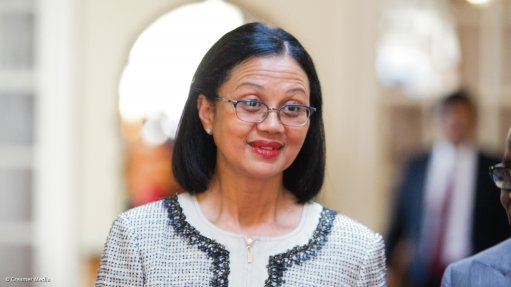
Energy Minister Tin Joemat-Pettersson
Photo by: Duane Daws
Environmental justice organisations Earthlife Africa and Southern Africa Faith Communities Environment Institute (Safcei) have taken to the courts to force government to make public its nuclear plans and follow a “fair and transparent” process in pursuing its nuclear ambitions.
The parties this week issued an application in the Cape Town High Court against Energy Minister Tina Joemat-Pettersson and President Jacob Zuma, with the National Energy Regulator of South Africa, the Speaker of the National Assembly Baleka Mbete and the chairperson of the National Council of Provinces Thandi Modise also cited for their involvement in the matter.
As South Africa pursued one of its largest procurements, the Minister stood accused of failing to initiate the necessary processes ensuring that any potential nuclear procurement deal was lawful, fair, equitable, transparent, competitive and cost-effective.
Addressing media in Johannesburg on Thursday, Earthlife and Safcei said they had faced many stumbling blocks attempting to obtain further information on the procurement process of up to eight nuclear power reactors to generate 9 600 MW of electricity, at a cost potentially exceeding R1-trillion.
“Notwithstanding the vast sums of money to be committed and the potentially long-term effect on the economy, for consumers of electricity and present and future generations of South Africans, the decision to proceed with procuring these nuclear power plants, and to have concluded such procurement in the next few months, has occurred without any of the necessary statutory and constitutional decisions having been lawfully taken,” said Earthlife senior programme officer Makoma Lekalakala.
Now the parties planned to challenge the legality and constitutionality of the intergovernmental agreement on strategic partnership and nuclear cooperation signed with Russia last year, as well as the provision assuring the agreement was binding on the international plane without the need for Parliamentary ratification.
Besides Russia, South Africa had inked intergovernmental agreements surrounding the nuclear procurement programme with France, China, the US and South Korea, the latter two of which were deemed “outdated”.
“Safcei believes this new nuclear power poses unacceptable environmental, social and economic risks to the people of South Africa and believes that concentrated focus on renewable energy is the key to alleviating poverty and addressing the developmental needs of the country,” Safcei spokesperson Liziwe McDaid added.
“The Russian nuclear agreement contains specific clauses that could have potentially devastating consequences for South Africa. These include that South Africa will be liable for any environmental incidents, including radioactive accidents, and any resultant economic consequences, while Russia will not have any liability.
“It also states that South Africa cannot procure nuclear services from any other entity without the consent of Russia,” she explained.
Zuma and Joemat-Pettersson were required to respond to the application within ten days.
Adrian Pole Attorneys, assisted by the Legal Resources Centre, were assisting Safcei and Earthlife.